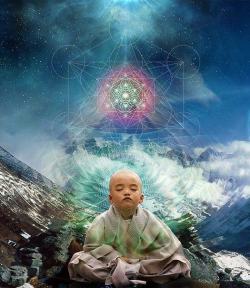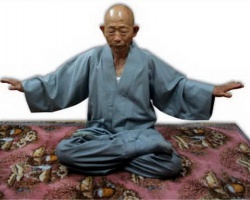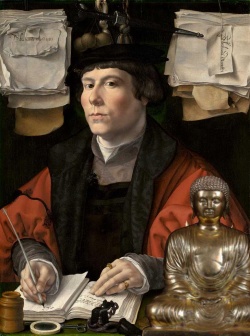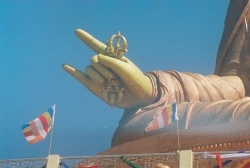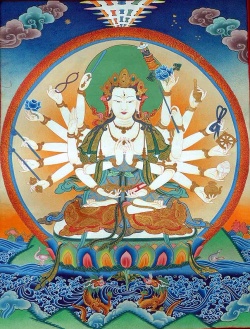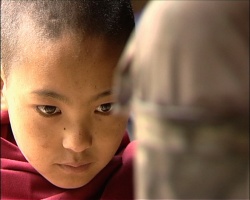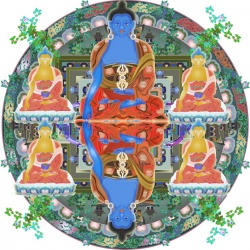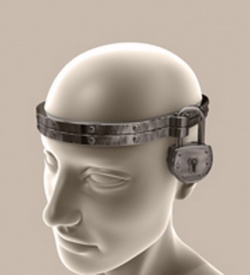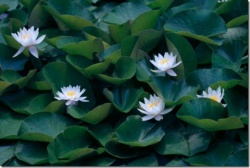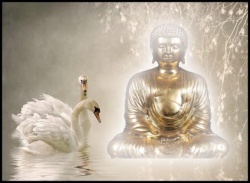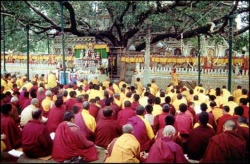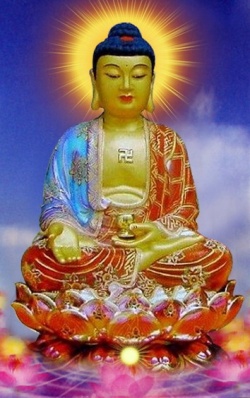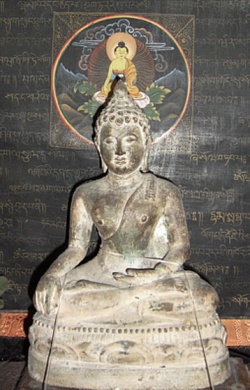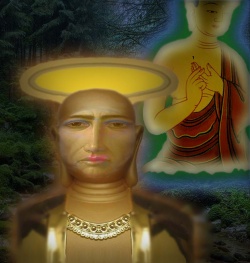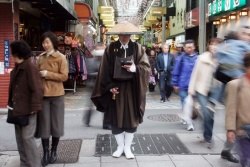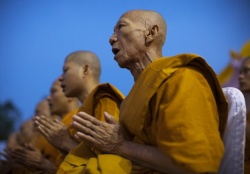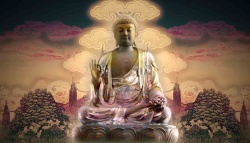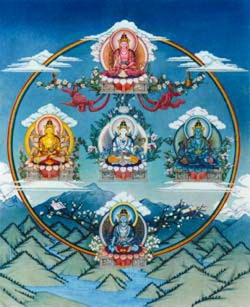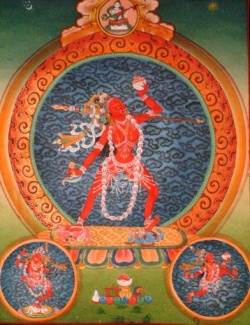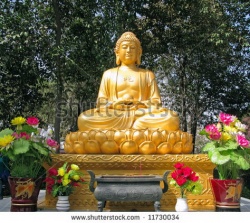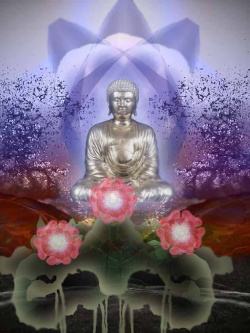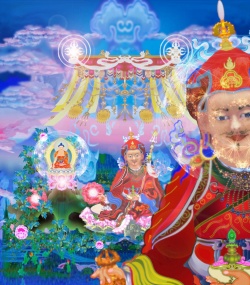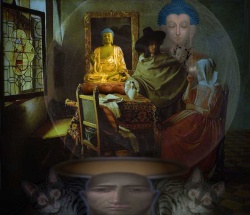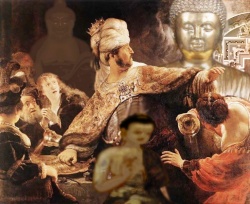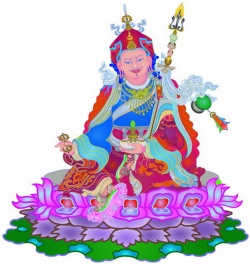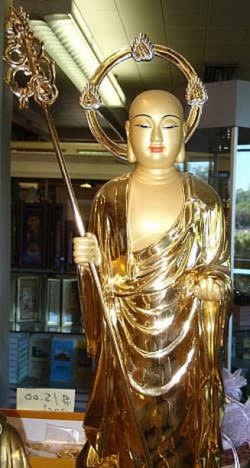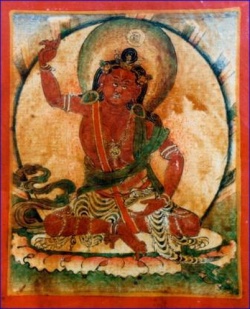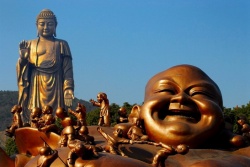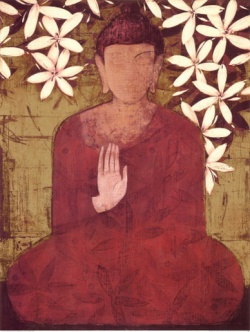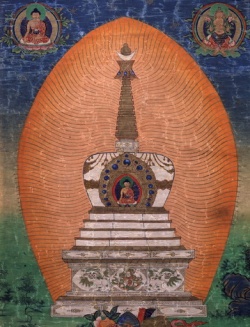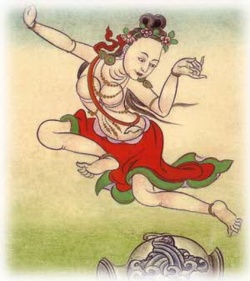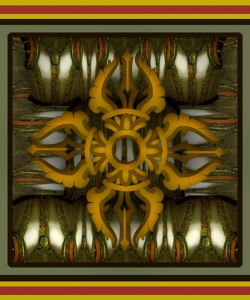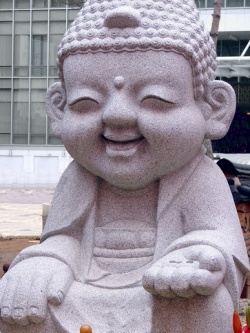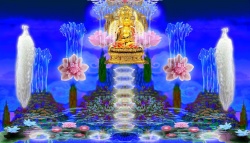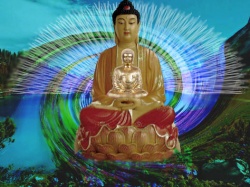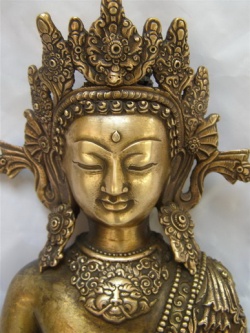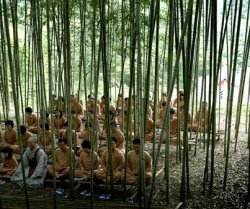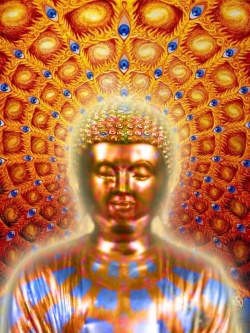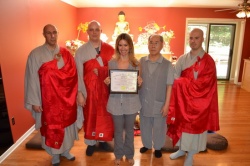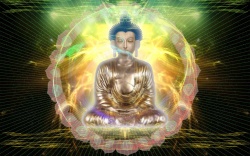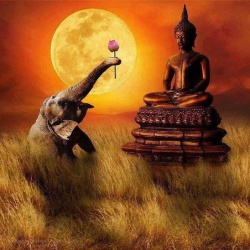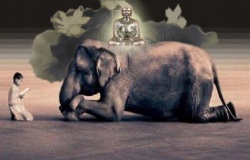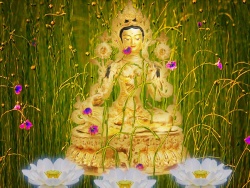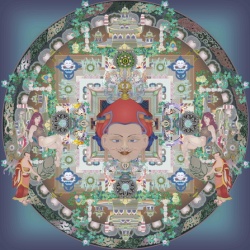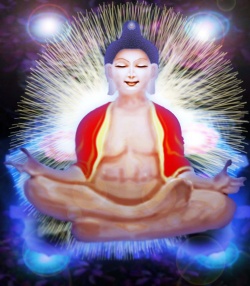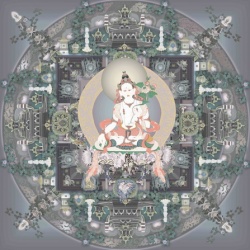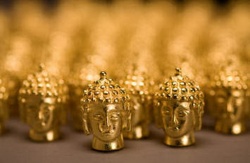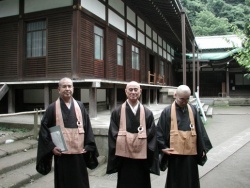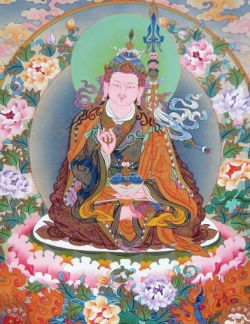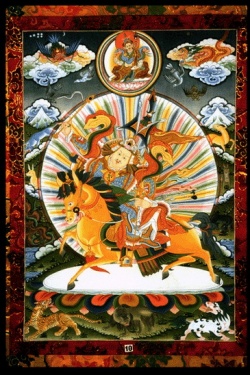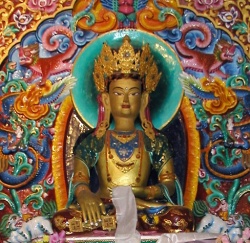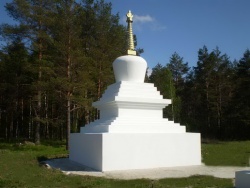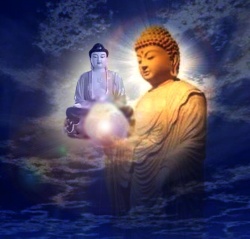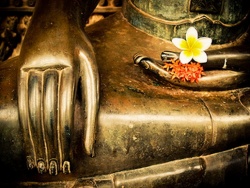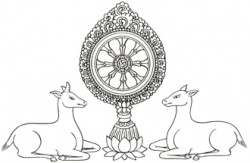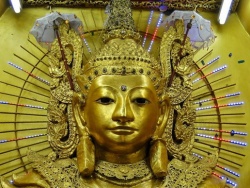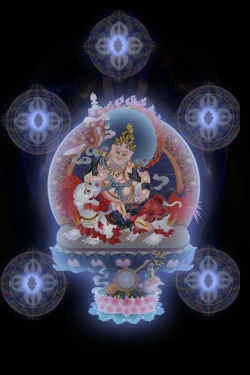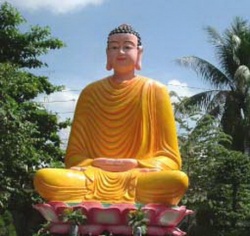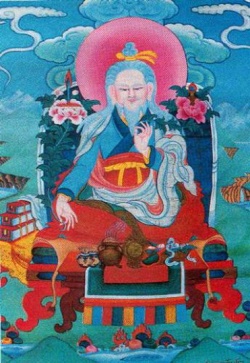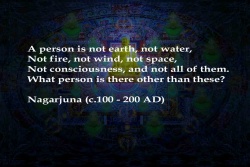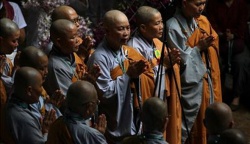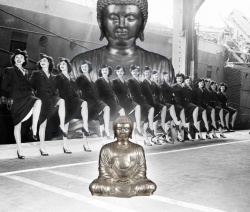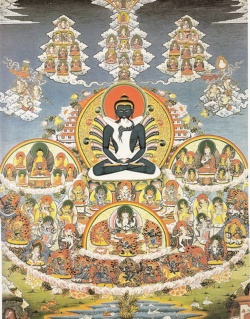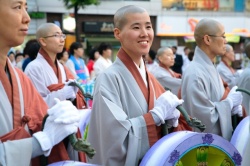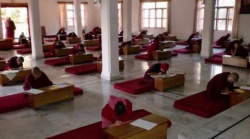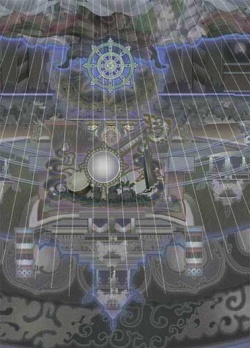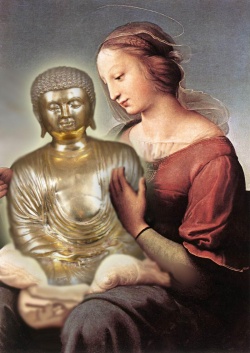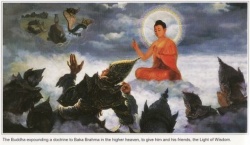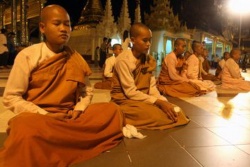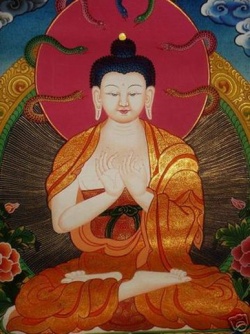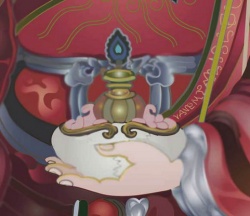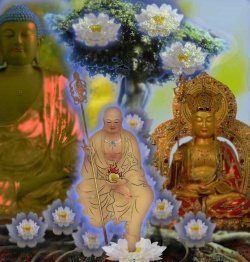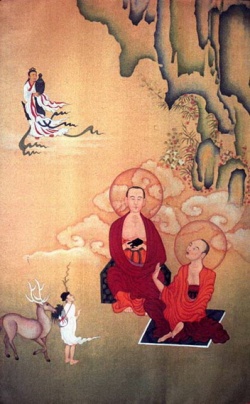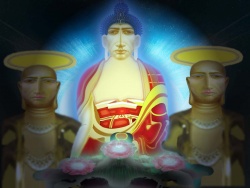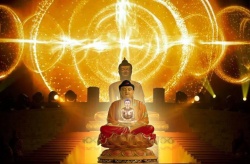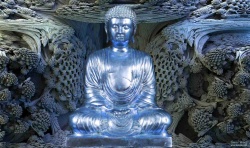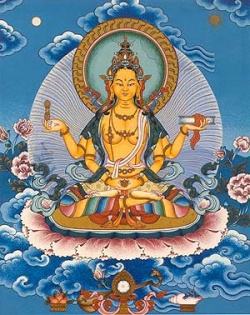The Precious Garland Ratnavali of Nagarjuna
Homage to all Buddhas and Bodhisattvas.
No. 1.
I bow down to the Omniscient,
Freed from all defects,
Adorned with all good qualities,
The sole friend of all beings.
No. 2.
O King, I will explain practices solely virtuous
To generate in you the doctrine,
For the practices will be established
In a vessel of the excellent doctrine.
No. 3.
In one who first practices high status
Definite goodness arises later,
For having attained high status,
One comes gradually to definite goodness.
No. 4.
High status is considered to be happiness,
Definite goodness is liberation.
The quintessence of their means
Is briefly faith and wisdom.
No. 5.
Due to having faith one relies on the practices,
Due to having wisdom one truly knows.
Of these two wisdom is the chief,
Faith is its prerequisite.
No. 6.
One who does not neglect the practices
Through desire, hatred, fear, or bewilderment
Is known as one of faith,
A superior vessel for definite goodness.
No. 7.
Having analyzed well
All deeds of body, speech, and mind,
Those who realize what benefit self and others
And always perform these are wise.
No. 8.
Not killing, not stealing,
Forsaking the mates of others,
Refraining completely from false,
Divisive, harsh, and senseless speech,
No. 9.
Thoroughly forsaking covetousness, harmful intent,
And the views of Nihilists-
These are the ten gleaming paths of action;
Their opposites are dark.
No. 10.ab
Not drinking intoxicants, a good livelihood,
Non-harming, respectful giving,
No. 10.c
Honoring the honorable, and love-
No. 10.d
Practice in brief is that.
No. 11.
Practice is not done by just
Mortifying the body,
For one has not forsaken injuring others
And is not helping others.
No. 12.
Those not esteeming the great path of excellent doctrine
Bright with giving, ethics, and patience,
Afflict their bodies, taking
An aberrant path like a cow path [deceiving oneself and those following].60
No. 13.
Their bodies embraced by the vicious snakes
Of the afflictive emotions, they enter for a long time
The dreadful jungle of cyclic existence
Among the trees of endless beings.
No. 14.
A short life comes through killing.
Much suffering comes through harming.
Poor resources, through stealing.
Enemies, through adultery.
No. 15.
From lying arises slander.
From divisiveness, a parting of friends.
From harshness, hearing the unpleasant.
From senselessness, one's speech is not respected.
No. 16.
Covetousness destroys one's wishes,
Harmful intent yields fright,
Wrong views lead to bad views,
And drink to confusion of the mind.
No. 17.
Through not giving comes poverty,
Through wrong livelihood, deception,
Through arrogance, a bad lineage,
Through jealousy, little beauty.
No. 18.ab
A bad color comes through anger,
Stupidity, from not questioning the wise.
No. 18.cd
These are effects for humans, But prior to all is a bad transmigration.
No. 19.
Opposite to the well-known
Fruits of these non-virtues
Is the arising of effects
Caused by all the virtues.
No. 20.
Desire, hatred, ignorance, and
The actions they generate are non-virtues.
Non-desire, non-hatred, non-ignorance,
And the actions they generate are virtues.
No. 21.
From non-virtues come all sufferings
And likewise all bad transmigrations,
From virtues, all happy transmigrations
And the pleasures of all lives.
No. 22.
Desisting from all non-virtues
And always engaging in virtues
With body, speech, and mind-
These are called the three forms of practice.
No. 23.
Through these practices one is freed from becoming
A hell-being, hungry ghost, or animal.
Reborn as a human or god one gains
Extensive happiness, fortune, and dominion.
No. 24.
Through the concentrations, immeasurables, and formlessnesses
One experiences the bliss of Brahma and so forth.
Thus in brief are the practices
For high status and their fruits.
No. 24.
Through the concentrations, immeasurables, and formlessnesses
One experiences the bliss of Brahma and so forth.
Thus in brief are the practices
For high status and their fruits.
No. 25.
The doctrines of definite goodness
Are said by the Conquerors
To be deep, subtle, and frightening
To the childish, who are not learned.
No. 26.
"I am not, I will not be.
I have not, I will not have,"
That frightens all the childish
And extinguishes fear in the wise.
No. 27.
By him who speaks only to help beings,
It was said that all beings
Have arisen from the conception of I
And are enveloped with the conception of mine.
No. 28.
"The I exists, the mine exists."
These are wrong as ultimates,
For the two are not [established]
By a thorough consciousness of reality just as it is.
No. 29.
The mental and physical aggregates arise
From the conception of I which is false in fact.
How could what is grown
From a false seed be true?
No. 30.
Having seen thus the aggregates as untrue,
The conception of I is abandoned,
And due to abandoning the conception of I
The aggregates arise no more.
No. 31.
Just as it is said
That an image of one's face is seen
Depending on a mirror
But does not really exist [as a face],
No. 32.
So the conception of I exists
Dependent on the aggregates,
But like the image of one's face
The I does not at all really exist.
No. 33.
Just as without depending on a mirror
The image of one's face is not seen,
So too the conception of I does not exist
Without depending on the aggregates.
No. 34.
When the Superior Ananda
Heard what this means,
He attained the eye of doctrine
And repeatedly spoke of it to monastics.
No. 35.
As long as the aggregates are conceived,
So long thereby does the conception of I exist.
Further, when the conception of I exists,
There is action, and from it there also is birth.
No. 36.
With these three pathways mutually causing each other
Without a beginning, a middle, or an end,
This wheel of cyclic existence
Turns like the wheel of a firebrand.
No. 37.
Because this wheel is not obtained from self, other,
Or from both, in the past, the present, or the future,
The conception of I is overcome
And thereby action and rebirth.
No. 38.
One who sees how cause and effect
Are produced and destroyed
Does not regard the world
As really existent or really non-existent.
No. 39.
One who has heard thus the doctrine extinguishing
All suffering, but does not examine it
And fears the fearless state
Trembles due to ignorance.
No. 40.
That all these will not exist in nirvana
Does not frighten you.
Why does their non-existence
Explained here cause you fright?
No. 41.
"In liberation there is no self and are no aggregates."
If liberation is asserted thus,
Why is the removal here of the self
And of the aggregates not liked by you?
No. 42.ab
If nirvana is not a non-thing,
Just how could it have thingness?
No. 42.cd
The extinction of the misconception
Of things and non-things is called nirvana.
No. 43.
In brief the view of nihilism
Is that effects of actions do not exist.
Without merit and leading to a bad state,
It is regarded as a "wrong view."
No. 44.
In brief the view of existence
Is that effects of actions exist.
Meritorious and conducive to happy transmigrations
It is regarded as a "right view."
No. 45.
Because existence and non-existence are extinguished by wisdom,
There is a passage beyond meritorious and ill deeds.
This, say the excellent, is liberation from
Bad transmigrations and happy transmigrations.
No. 46.
Seeing production as caused
One passes beyond non-existence.
Seeing cessation as caused
One also does not assert existence.
No. 47.
Previously produced and simultaneously produced [[[causes]])
Are non-causes; [thus] there are no causes in fact,
Because [such] production is not confirmed at all
As [[[existing]]) conventionally or in reality.
No. 48.
When this is, that arises,
Like short when there is long.
Due to the production of this, that is produced,
Like light from the production of a flame.
No. 49.
When there is long, there is short.
They do not exist through their own nature,
Just as due to the non-production
Of a flame, light also does not arise.
No. 50.
Having thus seen that effects arise
From causes, one asserts what appears
In the conventions of the world
And does not accept nihilism.
No. 51.
One who asserts, just as it is, cessation
That does not arise from conventions
Does not pass into [a view of] existence.
Thereby one not relying on duality is liberated.
No. 52.
A form seen from a distance
Is seen clearly by those nearby.
If a mirage were water,
Why is water not seen by those nearby?
No. 53.
The way this world is seen
As real by those afar
Is not so seen by those nearby
For whom it is signless like a mirage.
No. 54.
Just as a mirage is seemingly water
But not water and does not in fact exist [as water),
So the aggregates are seemingly a self
But not a self and do not exist in fact.
No. 55.
Having thought a mirage to be water
And then having gone there,
Someone would just be stupid to surmise,
"That water does not exist."
No. 56.
One who conceives of the mirage-like world
That it does or does not exist
Is consequently ignorant.
When there is ignorance, one is not liberated.
No. 57.
A follower of non-existence goes to bad transmigrations,
And a follower of existence goes to happy transmigrations.
Through correct and true knowledge
One does not rely on dualism and becomes liberated.
No. 58.
If through correct and true knowledge
[Such wise persons] do not assert existence and non-existence
And thereby [you think] that they follow non-existence,
Why should they not be followers of existence?
No. 59.
If from refuting existence
Non-existence would accrue to them,
Why from refuting non-existence
Would existence not accrue to them?
No. 60.
They implicitly have no nihilistic thesis
And also have no nihilistic behavior
And due to relying on [the path to] enlightenment have no nihilistic thought.
Hence how can they be regarded as nihilists?
No. 61.
Ask the Samkhyas, the followers of Kanada, Nirgranthas,
And the worldly proponents of a person and aggregates,
Whether they propound
What passes beyond "is" and "is not."
No. 62.
Thereby know that the ambrosia
Of the Buddhas' teaching is called profound,
An exclusive doctrine passing
Far beyond "is" and "is not."
No. 63.
How could the world exist in fact,
With a nature passed beyond the three times,
Not going when disintegrating, not coming,
And not staying even for an instant?
No. 64.
Because the coming, going, and staying
Of the world and nirvana do not exist
As [their own) reality, what difference
Is there in fact between the two?
No. 65.
If, due to the non-existence of staying,
Production and cessation do not exist as [their own) reality,
How could production, staying,
And ceasing exist in fact?
No. 66.
If always changing,
How are things non-momentary?
If not changing,
How can they be altered in fact?
No. 67.
Do they become momentary
Through partial or complete disintegration?
Because an inequality is not apprehended,
This momentariness cannot be admitted either way.
No. 68.
If momentary, then it becomes entirely non-existent;
Hence how could it be old?
Also if non-momentary, it is constant;
Hence how could it be old?
No. 69.
Just as a moment has an end, so a beginning
And a middle must be considered.
Thus due to this triple nature of a moment,
There is no momentary abiding of the world.
No. 70.
Also the beginning, middle, and end
Are to be analyzed like a moment.
Therefore beginning, middle, and end
Are also not [produced]61 from self or other.
No. 71.
Due to having many parts there is no unity,
There is not anything without parts.
Further, without one, there is not many.
Also, without existence there is no non-existence.
No. 72.
If it is thought that through disintegration or an antidote
An existent becomes non-existent,
Then how without an existent
Could there be disintegration or an antidote?
No. 73.
Hence, in fact there is no disappearance
Of the world through nirvana.
Asked whether the world has an end
The Conqueror remained silent.
No. 73.
Hence, in fact there is no disappearance
Of the world through nirvana.
Asked whether the world has an end
The Conqueror remained silent.
No. 74.
Because he did not teach this profound doctrine
To worldly beings who were not receptacles,
The All-Knowing is therefore known
By the wise to be omniscient.
No. 75.
Thus the doctrine of definite goodness
Was taught by the perfect Buddhas,
The seers of reality, as profound,
Unapprehendable, and baseless.
No. 76.
Frightened by this baseless doctrine,
Delighting in a base, not passing
Beyond existence and non-existence,
Unintelligent beings ruin themselves.
No. 77.ab
Afraid of the fearless abode,
Ruined, they ruin others.
No. 77.cd
O King, act in such a way
That the ruined do not ruin you.
No. 78.
O King, lest you be ruined
I will explain through the scriptures
The mode of the supramundane, just as it is,
The reality not partaking of dualism.
No. 79.
This profundity endowed with meanings drawn [from scriptures)
And beyond ill-deeds and meritorious deeds
Has not been tasted by those who fear the baseless-
The others-the Forders-and even by our own.
No. 80.
A person is not earth, not water,
Not fire, not wind, not space,
Not consciousness, and not all of them.
What person is there other than these?
No. 81.
Just as a person is not real
Due to being a composite of six constituents,
So each of the constituents also
Is not real due to being a composite.
No. 82.
The aggregates are not the self, they are not in it,
It is not in them, without them it is not,
It is not mixed with the aggregates like fire and fuel.
Therefore how could the self exist?
No. 83.
The three elements' are not earth, they are not in it,
It is not in them, without them it is not;
Since this also applies to each,
The elements, like the self, are false.
No. 84.
Earth, water, fire, and wind
Individually also do not inherently exist.
When any three are absent, an individual one does not exist.
When one is absent, the three also do not exist.
No. 85.
If when three are absent, an individual one does not exist
And if when one is absent, the three also do not exist,
Then each itself does not exist.
How could a composite be produced?
No. 86.
Otherwise, if each itself exists,
Why without fuel is there no fire?
Likewise why is there no water, wind, or earth
Without motility, obstructiveness, or cohesion?
No. 87.
If [it is answered that] fire is well known [not to exist without fuel but the other three elements exist by way of their own entities],
How could your three exist in themselves
Without the others? It is impossible for the three
Not to accord with dependent-arising.
No. 88.
How could those-that themselves
Exist individually-be mutually dependent?
How could those-that do not themselves
Exist individually-be mutually dependent?
No. 89.
If it is the case that they do not themselves exist individually,
But where there is one, the other three exist,
Then if unmixed, they are not in one place,
And if mixed, they do not themselves exist individually.
No. 90.
The elements do not themselves exist individually,
So how could their own individual charactersexist?
What do not themselves individually exist cannot predominate.
Their characters are regarded as conventionalities.
No. 91.
This mode [of refutation] is also to be applied
To colors, odors, tastes, and objects of touch;
Eye, consciousness, and form;
Ignorance, action, and birth;
No. 91.
This mode [of refutation] is also to be applied
To colors, odors, tastes, and objects of touch;
Eye, consciousness, and form;
Ignorance, action, and birth;
No. 92.
Agent, object, and action,
Number, possession, cause and effect,
Time, short and long, and so forth,
Name and name-bearer as well.
No. 93.
Earth, water, fire, and wind,
Long and short, subtle and coarse,
As well as virtue and so forth are said by the Subduer
To be ceased in the consciousness [of reality).
No. 94.
Earth, water, fire, and wind
Do not have a chance
In the face of that undemonstrable consciousness
Complete lord over the limitless.
No. 95.
Here long and short, subtle and coarse,
Virtue and non-virtue,
And here names and forms
All are ceased.
No. 96.
All those that earlier appeared to consciousness
Because of not knowing that [[[reality]])
Will later cease for consciousness in that way
Because of knowing that [[[reality]]).
No. 97.
All these phenomena of beings
Are seen as fuel for the fire of consciousness.
They are pacified through being burned
By the light of true discrimination.
No. 98.
The reality is later ascertained
Of what was formerly imputed by ignorance.
When a thing is not found,
How can there be a non-thing?
No. 99.
Because the phenomena of forms
Are only names, space too is only a name.
Without the elements how could forms exist?
Therefore even name-only does not exist.
No. 100.
Feelings, discriminations, compositional factors,
And consciousnesses are to be considered
Like the elements and the self.
Thereby the six constituents are selfless.
The first chapter of the Precious Garland, An Indication of High Status and Definite Goodness, is finished.
No. 101.
Just as when a banana tree
With all its parts is torn apart, there is nothing,
So when a person having the [six] constituents
Is divided, it is the same.
No. 102.
Therefore the Conquerors said,
"All phenomena are selfless."
Since this is so, all six constituents
Have been delineated as selfless for you.
No. 103.
Thus neither self nor non-self
Are to be apprehended as real.
Therefore the Great Subduer rejected
Views of self and of non-self.
No. 104.
Sights, sounds, and so forth were said by the Subduer
Not to be true and not to be false.
If from one position its opposite arises,
Both do not exist in fact.
No. 105.
Thus ultimately this world
Is beyond truth and falsity.
Therefore the Subduer does not assert
That it really exists or does not.
No. 106.
[[[Knowing]] that] these in all ways do not exist,
How could the All-Knower say
They have limits or no limits,
Or have both or neither?
No. 107.
"Innumerable Buddhas have come,
And likewise will come and are here at present.
There are zillions of sentient beings,
And in addition the Buddhas intend to abide in the three times.
No. 108.
"The extinguishing of the world in the three
Times does not cause it to increase,
Then why was the All-Knower silent
About the limits of the world?"
No. 109.
That which is secret for a common being
Is the profound doctrine,
The world as like an illusion,
The ambrosia of the Buddhas' teaching.
-
No. 110.
Just as the production and disintegration
Of an illusory elephant are seen,
But the production and disintegration
Do not really exist,
No. 111.
So the production and disintegration
Of the illusion-like world are seen,
But the production and disintegration
Do not ultimately exist.
No. 112.
Just as an illusory elephant,
Being only a bewildering of consciousness,
Does not come from anywhere,
Nor go anywhere, nor really stay,
No. 113.
So the illusion-like world,
Being only a bewildering of consciousness,
Does not come from anywhere,
Nor go anywhere, nor really stay.
No. 114.
Thus it has a nature beyond the three times.
Other than as the imputation of a convention
What world is there in fact
Which would exist or not?
No. 115.
For this reason the Buddha,
Except for keeping silent, said nothing
About the fourfold format: having or
Not having a limit, both, or neither.
No. 116.
When the body, which is unclean,
Coarse, and an object of the senses,
Does not stay in the mind [as having a nature of uncleanliness and pain)
Although it is continually in view,
No. 117.
Then how could this doctrine
Which is most subtle, profound,
Baseless, and not manifest,
Easily appear to the mind?
No. 118.
Realizing that because of its profundity
This doctrine is difficult for beings to understand,
The Subduer, having become enlightened
[At first] turned away from teaching doctrine.
No. 119.
This doctrine wrongly understood
Causes the unwise to be ruined
Because they sink into the uncleanliness
Of nihilistic views.
No. 120.
Further, the stupid who fancy
Themselves wise, having a nature
Ruined by rejecting [[[emptiness]]), go headfirst
To a terrible hell due to their wrong understanding.
No. 121.
Just as one comes to ruin
Through wrong eating but obtains
Long life, freedom from disease,
Strength, and pleasures through right eating,
No. 122.
So one comes to ruin
Through wrong understanding
But obtains bliss and highest enlightenment
Through right understanding.
No. 123.
Therefore having forsaken with respect to this [[[doctrine of emptiness]])
Nihilistic views and rejection,
Be supremely intent on correct understanding
For the sake of achieving all aims.
No. 124.
If this doctrine is not understood thoroughly,
The conception of an I prevails,
Hence come virtuous and non-virtuous actions
Which give rise to good and bad rebirths.
No. 125.
Therefore, as long as the doctrine removing
The conception of I is not known,
Take heed of the practices
Of giving, ethics, and patience.
No. 126.
A Lord of the Earth who performs actions
With their prior, intermediary,
And final practices
Is not harmed here or in the future.
No. 127.
Through the practices there are fame and happiness here,
There is no fear now or at the point of death,
In the next life happiness flourishes,
Therefore always observe the practices.
No. 128.
The practices are the best policy,
It is through them that the world is pleased;
Neither here nor in the future is one cheated
By a world that has been pleased.
No. 129.
The world is displeased
By the policies of non-practice.
Due to the displeasure of the world
One is not pleased here or in the future.
No. 130.
How could those with senseless deviant minds
On a path to bad transmigrations,
Wretched, intent on deceiving others,
Have understood what is meaningful?
No. 131.
How could those intent on deceiving others
Be persons of policy?
Through it they themselves will be cheated
In many thousands of births.
No. 132.
Even if you seek to harm an enemy,
You should remove your own defects and cultivate good qualities.
Through that you will help yourself,
And the enemy will be displeased.
No. 133.
You should cause the assembling
Of the religious and the worldly
Through giving, speaking pleasantly,
Purposeful behavior, and concordant behavior.
No. 134.
Just as by themselves the true words
Of kings generate firm trust,
So their false words are the best means
To create distrust.
No. 135.
What is not deceitful is the truth;
It is not an intentional fabrication.
What is solely helpful to others is the truth.
The opposite is falsehood since it does not help.
No. 136.
Just as a single splendid charity
Conceals the faults of kings,
So avarice destroys
All their wealth.
No. 137.
In peace there is profundity.
From profundity the highest respect arises,
From respect come influence and command,
Therefore observe peace.
No. 138.
From wisdom one has a mind unshakable,
Non-reliance on others, firmness,
And is not deceived. Therefore,
O King, be intent on wisdom.
No. 139.
A lord of humanity having the four goodnesses-
Truth, generosity, peace, and wisdom-
Is praised by gods and humans
As are the four good practices themselves.
No. 140.
Wisdom and practice always grow
For one who keeps company
With those who speak advisedly,
Who are pure, and who have unstained wisdom and compassion.
No. 141.
Rare are helpful speakers,
Listeners are very rare,
But rarer still are those who act at once
On words that though unpleasant are beneficial.
No. 142.
Therefore having realized that though unpleasant
It is helpful, act on it quickly,
Just as to cure an illness one drinks
Dreadful medicine from one who cares.62
No. 143.
Always considering the impermanence
Of life, health, and dominion,
You thereby will make intense effort
Solely at the practices.
No. 144.
Seeing that death is certain
And that, having died, you suffer from ill deeds,
You should not commit ill deeds
Though there might be temporary pleasure.
No. 145.
Sometimes no horror is seen
And sometimes it is.
If there is comfort in one,
Why do you have no fear for the other?
No. 146.
Intoxicants lead to worldly scorn,
Your affairs are ruined, wealth is wasted,
The unsuitable is done from delusion,
Therefore always avoid intoxicants.
No. 147.
Gambling causes avarice,
Unpleasantness, hatred, deception, cheating,
Wildness, lying, senseless talk, and harsh speech,
Therefore always avoid gambling.
No. 148.
Lust for a woman mostly comes
From thinking that her body is clean,
But there is nothing clean
In a woman's body in fact.
No. 149.
The mouth is a vessel of foul saliva
And scum between the teeth,
The nose a vessel of snot, slime, and mucus,
The eyes are vessels of tears and other excretions.
No. 150.
The abdomen and chest is a vessel
Of feces, urine, lungs, liver, and so forth.
Those who through obscuration do not see
A woman this way, lust for her body.
No. 151.
Just as some fools desire
An ornamented pot filled with what is unclean,
So ignorant, obscured
Worldly beings desire women.
No. 152.
If the world is greatly attached
Even to this ever-so-smelly body
Which should cause loss of attachment,
How can it be led to freedom from desire?
No. 153.
Just as pigs are greatly attached
To a site of excrement, urine, and vomit,
So some lustful ones desire
A site of excrement, urine, and vomit.
No. 154.
This city of a body with protruding holes
From which impurities emerge
Is called an object of pleasure
By beings who are stupid.
No. 155.
Once you yourself have seen the impurities
Of excrement, urine, and so forth,
How could you be attracted
To a body composed of those?
No. 156.
Why should you lust desirously for this
While recognizing it as an unclean form
Produced by a seed whose essence is impure,
A mixture of blood and semen?
No. 157.
One who lies on this impure mass
Covered by skin moistened
With those fluids, merely lies
On top of a woman's bladder,
No. 158.
If whether beautiful or ugly,
Whether old or young,
All female bodies are unclean,
From what attribute does your lust arise?
No. 159.
Just as it is not fit to desire
Filth although it has a good color,
Is very fresh, and has a nice shape,
So is it with a woman's body.
No. 160.
How could the nature of this putrid corpse,
A rotten mass covered outside by skin,
Not be seen when it looks
So very horrible?
No. 161.
"The skin is not foul,
It is like a garment."
Like a hide over a mass of impurities
How could it be clean?
No. 162.
A pot though beautiful outside,
Is reviled when filled with impurities.
Why is the body, filled with impurities
And foul by nature, not reviled?
No. 163.
If you revile against impurities,
Why not against this body
Which befouls clean scents,
Garlands, food, and drink?
No. 164.
Just as one's own or others' Impurities are reviled,
Why not revile against one's own
And others' unclean bodies?
No. 165.
Since your own body is
As unclean as a woman's,
Is it not suitable to part
From desire for self and other?
No. 165.
Since your own body is
As unclean as a woman's,
Is it not suitable to part
From desire for self and other?
No. 166.
If you yourself wash this body
Dripping from the nine wounds
And still do not think it unclean,
What use is [[[religious]]) instruction for you?
No. 167.
Whoever composes poetry
With metaphors elevating this body-
O how shameless! O how stupid!
How embarrassing before [[[wise]])63 beings!
No. 168.
Moreover, these sentient beings-
Obscured by the darkness of ignorance-
Quarrel most over what they desire,
Like dogs for the sake of some dirty thing.
No. 169.
There is pleasure when a sore is scratched,
But to be without sores is more pleasurable still.
Just so, there are pleasures in worldly desires,
But to be without desires is more pleasurable still.
No. 170.
If you analyze thus, even though
You do not achieve freedom from desire,
Because your desire has lessened
You will not lust for women.
No. 171.
To hunt game is a horrible
Cause of short life,
Fear, suffering, and hell,
Therefore always steadfastly keep from killing.
No. 172.
Those who frighten embodied beings
When they encounter them are malevolent
Like a snake spitting poison,
Its body completely stained with impurity.
No. 173.
Just as farmers are gladdened
When a great rain-cloud gathers,
So those who gladden embodied beings
When encountering them are beneficent.
No. 174.
Thus observe the practices incessantly
And abandon those counter to them.
If you and the world wish to attain
Unparalleled enlightenment,
No. 175.
Its roots are the altruistic aspiration to enlightenment
Firm like the monarch of mountains,
Compassion reaching to all quarters,
And wisdom not relying on duality.
No. 176.
O great King, listen to how
Your body will be adorned
With the thirty-two signs
Of a great being.
No. 177.
Through proper honoring of stupas,
Honorable beings, Superiors, and the elderly
You will become a Universal Monarch,
Your glorious hands and feet marked with [a design of] wheels.
No. 178.
O King, always maintain firmly
What you have vowed about the practices,
You will then become a Bodhisattva
With feet that are very level.
No. 179.
Through giving, speaking pleasantly,
Purposeful behavior, and concordant behavior
You will have hands with glorious
Fingers joined by webs [of light],
No. 180.
Through abundant giving
Of the best food and drink
Your glorious hands and feet will be soft;
Your hands, feet, shoulder blades,
And the nape of your neck will broaden,
So your body will be large and those seven areas broad.
No. 181.
Through never doing harm and freeing the condemned
Your body will be beautiful, straight, and large,
Very tall with long fingers
And broad backs of the heels.
No. 182.
Through spreading the vowed practices
You will have glory, a good color,
Your ankles will not be prominent,
Your body hairs will stand upwards.
No. 183.
Through your zest for knowledge, the arts,
And so forth, and through imparting them
You will have the calves of an antelope,
A sharp mind, and great wisdom.
No. 184.
If others seek your wealth and possessions,
Through the discipline of immediate giving
You will have broad arms and a pleasant appearance
And will become a leader of the world.
No. 185.
Through reconciling well
Friends who have become divided
You will become the best of those
Whose glorious secret organ retracts inside.
No. 186.
Through giving good houses
And nice comfortable carpets
Your color will be very soft
Like refined stainless gold.
No. 187.
Through giving the highest powers
And following a teacher properly
You will be adorned by each and every hair
And by a spiraling hair between the eyebrows.
No. 188.
Through speech that is pleasant and pleasing
And by acting upon the good speech [of others]
You will have curving shoulders
And a lion-like upper body.
No. 189.
Through nursing and curing the sick,
The area between your shoulders will be broad,
You will live in a natural state,
And all tastes will be the best.
No. 190.
Through initiating activities concordant
With the practices, your crown protrusion
Will stand out well, and [your body) will be
Symmetrical like a banana tree.
No. 191.
Through speaking true and soft words
Over a long time, O lord of humanity,
Your tongue will be long
And your voice that of Brahma.
No. 192.
Through speaking true words
Always and continuously
You will have cheeks like a lion,
Be glorious, and hard to overcome.
No. 193.
Through showing great respect,
Serving others, and doing what is fitting,
Your teeth will be very white,
Shining, and even.
No. 194.
Through using true and non-divisive
Speech over a long time
You will have forty glorious teeth
That are set evenly and are wondrous.
No. 195.
Through viewing beings with love
And without desire, hatred, or delusion
Your eyes will be bright and blue
With eyelashes like a bull.
No. 196.
Thus in brief know well
These thirty-two signs
Of a great lion of beings
Together with their causes.
No. 197.
The eighty beautiful features arise
From a concordant cause of love.
Fearing this text would be too long,
I will not, O King, explain them.
No. 198.
All Universal Emperors
Are regarded as having these,
But their purity, beauty, and luster
Cannot match even a little those of a Buddha.
No. 199.
The auspicious signs and beautiful features
Of a Universal Emperor Are said to arise [even]64 from the single cause
Of faith in the King of Subduers.
No. 200.abcd
But such virtue accumulated one-pointedly
For a hundred times ten million eons
Cannot produce even one
Of the hair-pores of a Buddha.
No. 200.efgh
Just as the brilliance of suns
Is slightly like that of fireflies,
So the signs of a Buddha are slightly like
Those of a Universal Emperor.
The second chapter of the Precious Garland, The Interwoven, is finished.
No. 201.
Great king, hear from the great scriptures
Of the Great Vehicle How the marks of a Buddha
Arise from inconceivable merit.
No. 202.
The merit giving rise to all
Solitary Realizers, to Learners, and Non-Learners,
And all the merit of the transient world
Is measureless like the universe itself.
No. 203.
Through such merit ten times extended
One hair-pore of a Buddha is achieved.
All the hair-pores of a Buddha
Arise in just the same way.
No. 204.
Through multiplying by a hundred
The merit which produces
All the hair-pores of a Buddha
One auspicious beauty is acquired.
No. 205.
O King, as much merit as is required
For one auspicious beautiful feature,
So much also is required
For each up to the eightieth.
No. 206.
Through multiplying a hundred-fold
The collection of merit which achieves
The eighty auspicious beautiful features
One mark of a great being arises.
No. 207.
Through multiplying a thousand-fold
The extensive merit that is the cause
Of achieving the thirty signs
The hair-treasure like a full moon arises.
No. 208.
Through multiplying a hundred thousand-fold
The merit for the hair-treasure
A Protector's crown-protrusion
Is produced, imperceptible as it actually is.
Through increasing ten million times
A hundred thousand the merit
For the crown-protrusion there comes
The excellence producing the euphony
Of a Buddha's speech and its sixty qualities.
No. 209.
Though such merit is measureless,
It is said for brevity to have a measure,
Just as [the merit of]65 the world is said
For brevity to be included in the ten directions.
No. 210.
When the causes of even the Form Body
Of a Buddha are as immeasurable
As the world, how then could the causes
Of the Truth Body be measured?
No. 211.
If the causes of all things are small
But they produce extensive effects,
The thought that the measureless causes of Buddhahood
Have measurable effects should be eliminated.
No. 212.
The Form Body of a Buddha
Arises from the collections of merit.
The Truth Body in brief, O King,
Arises from the collections of wisdom.
No. 213.
Thus these two collections
Are the causes of attaining Buddhahood,
So in sum always rely
Upon merit and wisdom.
No. 214.
Do not feel inadequate about this [[[accumulation]])
Of merit to achieve enlightenment,
Since reasoning and scripture
Can restore one's spirits.
No. 215.
Just as in all directions
Space, earth, water, fire, and wind
Are without limit,
So suffering sentient beings are limitless.
No. 216.
Through their compassion
Bodhisattvas are determined to lead
These limitless sentient beings out of suffering
And establish them in Buddhahood.
No. 217.
[Hence] whether sleeping or not sleeping,
After thoroughly assuming [such compassion)
Those who remain steadfast-
Even though they might not be meticulous-
No. 218.
Always accumulate merit as limitless as all sentient beings
Since sentient beings are limitless.
Know then that since [the causes) are limitless,
Limitless Buddhahood is not hard to attain.
No. 219.
[[[Bodhisattvas]]) stay for a limitless time [in the world);
For limitless embodied beings they seek
The limitless [good qualities of] enlightenment
And perform limitless virtuous actions.
No. 220.
Hence though enlightenment is limitless,
How could they not attain it
With these four limitless collections
Without being delayed for long?
No. 221. The limitless collection of merit
And the limitless collection of wisdom
Eradicate just quickly
Physical and mental sufferings.
No. 222.
The physical sufferings of bad transmigrations
Such as hunger and thirst arise from ill deeds;
Bodhisattvas do not commit ill deeds,
And due to meritorious deeds do not have
physical suffering in other lives.
No. 223.
The mental sufferings of desire, hatred, fear,
Lust, and so forth arise from obscuration.
Through knowing them to be baseless
They just quickly forsake mental suffering.
No. 224.
Since thus they are not greatly harmed
By physical and mental suffering,
Why should they be discouraged
Though they lead beings in all worlds?
No. 225.
It is hard to bear suffering even for a little,
What need is there to speak of doing so for long!
What could bring harm even over limitless time
To happy beings who have no suffering?
No. 226.
They have no physical suffering;
How could they have mental suffering?
Through their compassion they feel pain
For the world and so stay in it long.
No. 227.
Hence do not feel inadequate thinking,
"Buddhahood is far away."
Always strive at these [collections]
To remove defects and attain good qualities.
No. 228.
Realizing that desire, hatred, and obscuration
Are defects, forsake them completely.
Realizing that non-desire, non-hatred, and non-obscuration
Are good qualities, inculcate them with vigor.
No. 229.
Through desire one goes into a hungry ghost transmigration,
Through hatred one is impelled into a hell,
Through obscuration one mostly goes into an animal transmigration.
Through stopping these one becomes a god or a human.
No. 230.
Eliminating defects and acquiring good qualities
Are the practices of those seeking high status.
Thoroughly extinguishing conceptions through consciousness [of reality)
Is the practice of those seeking definite goodness.
No. 231.
You should respectfully and extensively construct
Images of Buddha, monuments, and temples
And provide residences,
Abundant riches, and so forth.
No. 232.
Please construct from all precious substances
Images of Buddha with fine proportions,
Well designed and sitting on lotuses,
Adorned with all precious substances.
No. 233.
You should sustain with all endeavor
The excellent doctrine and the communities
Of monastics, and decorate monuments
With gold and jeweled friezes.
No. 234.
Revere the monuments
With gold and silver flowers,
Diamonds, corals, pearls,
Emeralds, cat's eye gems, and sapphires.
No. 235.
To revere propounders of doctrine
Is to do what pleases them-
[[[Offering]]) goods and services
And relying firmly on the doctrine.
No. 236.
Listen to teachers with homage
And respect, serve, and pray to them.
Always respectfully revere
The [other] Bodhisattvas.
No. 237.
You should not respect, revere,
Or do homage to others, the Forders,
Because through that the ignorant
Would become enamored of the faulty.
No. 238.
You should make donations of pages and books
Of the word of the King of Subduers
And of the treatises they gave rise to,
Along with their prerequisites, pens and ink.
No. 239.
As ways to increase wisdom,
Wherever there is a school in the land
Provide for the livelihood of teachers
And give lands to them [for their provision].
No. 240.
In order to alleviate the suffering
Of sentient beings-the old, young, and infirm-
You should establish through the estates [that you control]66
Doctors and barbers throughout your country.
No. 241.
O One of Good Wisdom, please provide
Hostels, parks, dikes,
Ponds, rest-houses, water-vessels,
Beds, food, hay, and wood.
No. 242.
Please establish rest-houses
In all towns, at temples, and in all cities
And provide water-vessels
On all arid roadways.
No. 243.
Always care compassionately
For the sick, the unprotected, those stricken
With suffering, the lowly, and the poor
And take special care to nourish them.
No. 244.
Until you have given to monastics and beggars
Seasonally-appropriate food and drink,
As well as produce, grain, and fruit,
You should not partake of them.
No. 245.
At the sites of the water-vessels
Place shoes, umbrellas, water-filters,
Tweezers for removing thorns,
Needles, thread, and fans.
No. 246.
Within vessels place the three medicinal fruits,
The three fever medicines, butter,
Honey, eye medicines, and antidotes to poison,
And write out mantras and prescriptions.
No. 247.
At the sites of the vessels place
Salves for the body, feet, and head,
As well as wool, stools, gruel,
Jars [for getting water),67 cooking pots, axes, and so forth.
No. 248.
Please have small containers
In the shade filled with sesame,
Rice, grains, foods, molasses,
And suitable water.
No. 249.
At the openings of ant-hills
Please have trustworthy persons
Always put food, water,
Sugar, and piles of grain.
No. 250.
Before and after taking food
Always appropriately offer fare
To hungry ghosts, dogs,
Ants, birds, and so forth.
No. 251.
Provide extensive care
For the persecuted, the victims of crop failure,
The stricken, those suffering contagion,
And for beings in conquered areas.
No. 252.
Provide stricken farmers
With seeds and sustenance.
Eliminate high taxes [levied by the previous monarch].68
Reduce the tax rate [on harvests].69
No. 253.
Protect [the poor] from the pain of wanting [your wealth).
Set up no [new] tolls and reduce those [that are heavy].
Also free [traders from other areas] from the afflictions
That come from waiting at your door.
No. 254.
Eliminate robbers and thieves
In your own and others' countries.
Please set prices fairly
And keep profits level [even during scarcity].
No. 255.
You should know full well [the counsel]
That your ministers offer,
And should always enact it
If it nurses the world.
No. 256.
Just as you are intent on thinking
Of what could be done to help yourself,
So you should be intent on thinking
Of what could be done to help others.
No. 257.
If only for a moment make yourself
Available for the use of others
Just as earth, water, fire, wind, medicine,
And forests [are available to all].
No. 258.
Even during their seventh step
Merit measureless as the sky
Is generated in Bodhisattvas
Whose attitude is to give all wealth away.
No. 259.
If you give to those so seeking
Girls of beauty well adorned,
You will thereby attain
Thorough retention of the excellent doctrine.
No. 260.
Formerly the Subduer provided
Along with every need and so forth
Eighty thousand girls
With all adornments.
No. 261.
Lovingly give to beggars
Various and glittering
Clothes, adornments, perfumes,
Garlands, and enjoyments.
No. 262.
If you provide [facilities]
For those most deprived who lack
The means [to study] the doctrine,
There is no greater gift than that.
No. 263.
Even give poison
To those whom it will help,
But do not give even the best food
To those whom it will not help.
No. 264.
Just as it is said that it will help
To cut off a finger bitten by a snake,
So the Subduer says that if it helps others,
One should even bring [temporary]70 discomfort.
No. 265.
You should respect most highly
The excellent doctrine and its proponents.
You should listen reverently to the doctrine
And also impart it to others.
No. 266.
Take no pleasure in worldly talk;
Take delight in what passes beyond the world.
Cause good qualities to grow in others
In the same way [you wish them] for yourself.
No. 267.
Please do not be satisfied with doctrine heard,
But retain and discriminate meanings.
Please always be intent
On offering presents to teachers.
No. 268.
Do not recite [the books of] worldly Nihilists, and so forth.
Forsake debating in the interest of pride.
Do not praise your own good qualities.
Speak of the good qualities even of your foes.
No. 269.
[When debating)71 do not attack to the quick.
Do not talk about others
With bad intent. Individually
Analyze your own mistakes yourself.
No. 270.
You should root out completely from yourself
The faults the wise decry in others,
And through your influence
Also cause others to do the same.
No. 271.
Considering the harm others do to you
As created by your former deeds, do not anger.
Act such that further suffering will not be created
And your own faults will disappear.
No. 272.
Without hope of reward
Provide help to others.
Bear suffering alone,
And share your pleasures with beggars.
No. 273.
Do not be inflated
Even by the prosperity of gods.
Do not be depressed
Even by the poverty of hungry ghosts.
No. 274.
For your sake always speak the truth.
Even should it cause your death
Or ruin your governance,
Do not speak in any other way.
No. 275.
Always observe the discipline
Of actions just as it has been explained.
In that way, O glorious one, you will become
The best of authoritative beings upon the earth.
No. 276.
You should always analyze well
Everything before you act,
And through seeing things correctly as they are
Do not put full reliance on others.
No. 277.
(1) Through these practices your realm will be happy,
(2) A broad canopy of fame
Will rise in all directions,
And (3) your officials will respect you fully.
No. 278.
The causes of death are many,
Those of staying alive are few,
These too can become causes of death,
Therefore always perform the practices.
No. 279.
If you always perform thus the practices,
The mental happiness which arises
In the world and in yourself
Is most favorable.
No. 280.
(4) Through the practices you will sleep happily
And will awaken happily.
(5) Because your inner nature will be without defect,
Even your dreams will be happy.
No. 281.
(1) Intent on serving your parents,
Respectful to the principals of your lineage,
Using your resources well, patient, generous,
With kindly speech, without divisiveness, and truthful,
No. 282.
Through performing such discipline for one lifetime
You will become a monarch of gods
Whereupon even more so you will be a monarch of gods.
Therefore observe such practices.
No. 283.
(2) Even three times a day to offer
Three hundred cooking pots of food
Does not match a portion of the merit
In one instant of love.
No. 284.
Though [through love) you are not liberated
You will attain the eight good qualities of love-
Gods and humans will be friendly,
Even [[[non-humans]]) will protect you,
No. 285.
You will have mental pleasures and many [[[physical]])72 pleasures,
Poison and weapons will not harm you,
Without striving you will attain your aims,
And be reborn in the world of Brahma.
No. 286.
(3) If you cause sentient beings to generate
The altruistic aspiration to enlightenment and make it firm,
You will always attain an altruistic aspiration to enlightenment
Firm like the monarch of mountains.
No. 287.
(4) Through faith you will not be without leisure,
(5) Through good ethics you will move in good transmigrations,
(6) Through becoming familiar with emptiness
You will attain detachment from all phenomena.
No. 288.
(7) Through not wavering you will attain mindfulness,
(8) Through thinking you will attain intelligence,
(9) Through respect you will be endowed with realization of meaning,
(10) Through guarding the doctrine you will become wise.
No. 289.
(11) Through making the hearing and the giving
Of the doctrine be unobstructed
You will company with Buddhas
And will quickly attain your wishes.
No. 290.
(12) Through non-attachment you will achieve the meaning [of doctrines),
(13) Through not being miserly your resources will increase,
(14) Through not being proud you will become chief [of those respected],
(15) Through enduring the doctrine you will attain retention.
No. 291.
(16) Through giving the five essentials
As well as non-fright to the frightened
You will not be harmed by any demons
And will become the best of the mighty.
No. 292.
(17) Through offering series of lamps at monuments
And through offering lamps in dark places
As well as the oil for them
You will attain the divine eye.
No. 293.
(18) Through offering musical instruments and bells or the worship of monuments
And through offering drums and trumpets
You will attain the divine ear.
No. 294.
(19) Through not mentioning others' mistakes
And not talking of others' defective limbs
But protecting their minds
You will attain knowledge of others' minds.
No. 295.
(20) Through giving shoes and conveyances,
Through serving the feeble,
And through providing teachers with transport
You will attain the skill to create magical emanations.
No. 296.
(21) Through acting for the doctrine,
Remembering books of doctrine and their meaning,
And through stainless giving of the doctrine
You will attain memory of your continuum of lives.
No. 297.
(22) Through knowing thoroughly, correctly, and truly
That all phenomena lack inherent existence,
You will attain the sixth clairvoyance-
The excellent extinction of all contamination.
No. 298.
(23) Through meditatively cultivating the wisdom of reality
Which is the same [for all phenomena) and is moistened with compassion
For the sake of liberating all sentient beings,
You will become a Conqueror endowed with all supreme aspects.
No. 299.
(24) Through multitudes of pure wishes
Your Buddha Land will be purified.
(25) Through offering gems to the Kings of Subduers
You will emit infinite light.
No. 300.
Therefore knowing the concordance
Of actions and their effects,
Always help beings in fact.
Just that will help yourself.
The third chapter of the Precious Garland, A Compendium of the Collections for Enlightenment, is finished.
No. 301.
Monarchs who do what is against the practices
And senseless are mostly praised
By their citizens, for it is hard to know
What will or will not be tolerated.
Hence it is hard to know
What is useful or not [to say] .
No. 302.
If useful but unpleasant words
Are hard to speak to anyone else,
What could I, a monk, say to you,
A King who is a lord of the great earth?
No. 303.
But because of my affection for you
And from compassion for all beings,
I tell you without hesitation
That which is useful but unpleasant.
No. 304.
The Supramundane Victor said that students are to be told
The truth-gentle, meaningful, and salutary-
At the proper time and from compassion.
That is why you are being told all this.
No. 305.
O Steadfast One, when true words
Are spoken without belligerence,
They should be taken as fit to be heard,
Like water fit for bathing.
No. 306.
Realize that I am telling you
What is useful here and otherwise.
Act on it so as to help
Yourself and also others.
No. 307.
If you do not make contributions of the wealth
Obtained from former giving to the needy,
Through your ingratitude and attachment
You will not obtain wealth in the future.
No. 308.
Here in the world workers do not carry
Provisions for a journey unpaid,
But lowly beggars, without payment, carry to your future life
[What you give them] multiplied a hundred times.
No. 309.
Always be of exalted mind
And take delight in exalted deeds.
From exalted actions arise
All effects that are exalted.
No. 310.
Create foundations of doctrine, abodes
Of the Three Jewels-fraught with glory and fame-
That lowly kings have not even
Conceived in their minds.
No. 311.
O King, it is preferable not to create
Foundations of doctrine that do not stir
The hairs of wealthy kings
Because [those centers] will not become famous even after your death.
No. 312.
Through your great exaltation, use even all your wealth
Such that the exalted become free from pride,
[The equal]73 become delighted,
And the inclinations of the lowly are reversed.
No. 313.
Having let go of all possessions,
[At death) powerless you must go elsewhere,
But all that has been used for the doctrine
Precedes you [as good karma),
No. 314.
When all the possessions of a previous monarch
Come under the control of the successor,
Of what use are they then to the former monarch
For practice, happiness, or fame?
No. 315.
Through using wealth there is happiness here in this life,
Through giving there is happiness in the future,
From wasting it without using or giving it away,
There is only misery. How could there be happiness?
No. 316.
Because of lack of power while dying,
You will be unable to make donations by way of your ministers
Who will shamelessly lose affection for you
And will seek to please the new monarch.
No. 317.
Hence while in good health create foundations of doctrine
Immediately with all your wealth,
For you are living amidst the causes of death
Like a lamp standing in a breeze.
No. 318.
Also you should maintain other centers of doctrine
Established by the previous kings-
All the temples and so forth-
As they were before.
No. 319.
Please have them attended by those
Who are not harmful, are virtuous,
Keep their vows, are kind to visitors, truthful,
Patient, non-combative, and always diligent.
No. 320.
Cause the blind, the sick, the lowly,
The protectorless, the destitute,
And the crippled equally to obtain
Food and drink without interruption.
No. 321.
Provide all types of support
For practitioners who do not seek it
And even for those living
In the countries of other monarchs.
No. 322.
At all centers of the doctrine
Appoint attendants who are
Not negligent, not greedy, skillful,
Religious, and not harmful to anyone.
No. 323.
Appoint ministers who know good policy,
Who practice the doctrine, are civil,
Pure, harmonious, undaunted, of good lineage,
Of excellent ethics, and grateful.
No. 324.
Appoint generals who are generous,
Without attachments, brave, kindly,
Who use [the treasury] properly, are steadfast,
Always conscientious, and practice the doctrine.
No. 325.
As administrators appoint elders
Of religious disposition, pure, and able,
Who know what should be done, are skilled in the [[[Wikipedia:royal|royal]]]74 treatises,
Understand good policy, are unbiased, and are kindly.
No. 326.
Every month you should hear from them
About all the income and expenses,
And having heard, you yourself should tell them
All that should be done for the centers of doctrine and so forth.
No. 327.
If your realm exists for the doctrine
And not for fame or desire,
Then it will be extremely fruitful.
If not, its fruit will be misfortune.
No. 328.
O Lord of Humans, since in this world nowadays
Most are prone to wreak havoc on each other,
Listen to how your governance
And your practice should be.
No. 329.
Let there always be around you many persons
Old in experience, of good lineage,
Knowing good policy, who shrink from ill deeds,
Are agreeable, and know what should be done.
No. 330.
Even to those whom they have rightfully fined,
Bound, punished, and so forth,
You, being moistened with compassion,
Should always be caring.
No. 331.
O King, through compassion you should
Always generate just an attitude of altruism
Even for all those embodied beings
Who have committed awful ill deeds.
No. 332.
Especially generate compassion
For those whose ill deeds are horrible, the murderers.
Those of fallen nature are receptacles
Of compassion from those whose nature is magnanimous.
No. 333.
Free the weaker prisoners
After a day or five days.
Do not think the others
Are not to be freed under any conditions.
No. 334.
For each one whom you do not think to free
You will lose the [layperson's] vow.
Due to having lost the vow,
Faults will constantly be amassed.
No. 335.
As long as prisoners are not freed,
They should be made comfortable
With barbers, baths, food, drink,
Medicine, and clothing.
No. 336.
Just as deficient children are punished
Out of a wish to make them competent,
So punishment should be carried out with compassion,
Not through hatred nor desire for wealth.
No. 337.
Once you have analyzed and thoroughly recognized
The angry murderers,
Have them banished
Without killing or tormenting them.
No. 338.
In order to maintain control, oversee all the country
Through the eyes of agents.
Always conscientious and mindful,
Do what accords with the practices.
No. 339.
Continually honor in an exalted way
Those who are foundations of good qualities
With gifts, respect, and service,
And likewise honor all the rest.
No. 340.
The birds of the populace will alight upon
The royal tree providing the shade of patience,
Flourishing flowers of respect,
And large fruits of resplendent giving.
No. 341.
Monarchs whose nature is generosity
Are liked if they are strong,
Like a sweet hardened outside
With cardamom and pepper.
No. 342.
If you analyze with reason thus,
Your governance will not degenerate.
It will not be without principle
Nor become unreligious but be religious.
No. 343.
You did not bring your dominion with you from your former life
Nor will you take it to the next.
Since it was gained through religious practice,
You would be wrong to act against the practices.
No. 344.
O King, exert yourself
To avert a sequence
Of miserable supplies for the realm
Through [[[Wikipedia:misuse|misuse]] of] royal resources.
No. 345.
O King, exert yourself
To increase the succession
Of the dominion's resources
Through [proper use of] royal resources.
No. 346.
Although Universal Monarchs rule
Over the four continents, their pleasures
Are regarded as only two-
The physical and the mental.
No. 347.
Physical feelings of pleasure
Are only a lessening of pain.
Mental pleasures are made of thought,
Created only by conceptuality.
No. 348.
All the wealth of worldly pleasures
Are just a lessening of suffering,
Or are only [creations of] thought,
Hence they are in fact not meaningful.
No. 349.
Just one by one there is enjoyment
Of continents, countries, towns, homes,
Conveyances, seats, clothing, beds,
Food, drink, elephants, horses, and women.
No. 350.
When the mind has any [one of these as its object),
Due to it there is said to be pleasure,
But since at that time no attention is paid to the others,
The others are not then in fact meaningful [[[causes]] of pleasure).
No. 351.
When [all] five senses, eye and so forth,
[Simultaneously] apprehend their objects,
A thought [of pleasure) does not refer [to all of them],
Therefore at that time they do not [all] give pleasure.
No. 352.
Whenever any of the [five] objects is known
[As pleasurable) by one of the [five] senses,
Then the remaining [[[objects]]) are not so known by the remaining [[[senses]])
Since they then are not meaningful [[[causes]] of pleasure).
No. 353.
The mind apprehends an image of a past object
Which has been apprehended by the senses
And imagines and fancies
It to be pleasurable.
No. 354.
Also the one sense which here [in the world
Is said to] know one object
Is meaningless without an object,
And the object also is meaningless without it.
No. 355.
Just as a child is said to be born
In dependence on a father and a mother,
So a [[[visual]]) consciousness is said to arise
In dependence on an eye sense and on a form.
No. 356.
Past and future objects
And the senses are meaningless,
So too are present objects
Since they are not distinct from these two."
No. 357.
Just as due to error the eye perceives
A whirling firebrand as a wheel,
So the senses apprehend
Present objects [as if real].
No. 358.
The senses and their objects are regarded
As being composed of the elements.
Since the elements are meaningless individually,
These also are meaningless in fact.
No. 359.
If the elements are each different,
It follows that there could be fire without fuel.
If mixed, they would be characterless.
Such is also to be ascertained about the other elements.
No. 360.
Because the elements are thus meaningless in both these ways,
So too is a composite.
Because a composite is meaningless
So too are forms meaningless in fact.
No. 361.
Also because consciousnesses, feelings,
Discriminations, and compositional factors
Altogether and individually are without essential factuality,
[[[Pleasures]]) are not ultimately meaningful.
No. 362.
Just as lessening of pain
Is fancied to be pleasure in fact,
So destruction of pleasure
Is also fancied to be pain.
No. 363.
Thus attachment to meeting with pleasure
And attachment to separating from pain
Are to be abandoned because they do not inherently exist.
Thereby those who see thus are liberated.
No. 364.
What sees [[[reality]]) ?
Conventionally it is said to be the mind
[For] without mental factors there is no mind
[And hence minds and mental factors) are meaningless,
due to which it is not asserted that they are simultaneous.
No. 365.
Knowing thus correctly, just as it is,
That transmigrating beings do not exist in fact,
One passes [from suffering) not subject [to rebirth and hence] without appropriating [[[rebirth]]),
Like a fire without its cause.
No. 366.
Bodhisattvas also who have seen it thus,
Seek perfect enlightenment with certainty.
They make the connection between lives
Until enlightenment only through their compassion.
No. 367.
Since the collections [of merit and wisdom) of Bodhisattvas
Were taught by the One Gone Thus in the Great Vehicle,
Those who are bewildered [about the full extent of the paths and fruits of the Great Vehicle)76
Deride them out of antagonism.
No. 368.
Either through not knowing the good qualities [of altruism) and the defects [of mere self-concern],
Or identifying good qualities as defects,
Or through despising good qualities,
They deride the Great Vehicle.
No. 369.
Those who deride the Great Vehicle-
Knowing that to harm others is defective
And that to help others is a good quality-
Are said to despise good qualities.
No. 370.
Those who despise the Great Vehicle,
Source of all good qualities in that [it teaches] taking delight
Solely in the aims of others due to not looking to one's own,
Consequently burn themselves [in bad transmigrations],
No. 371.
One type with faith [in emptiness forsakes it]79 through misconception [of it as denying cause and effect).
Others who are angry [forsake emptiness) through despising it.
If even the faithful type is said [in sutra) to be burned,
What can be said about those who turn their backs on it through despising it!
No. 372.
Just as it is explained in medicine
That poison can removed by poison,
What contradiction is there in saying
That what is injurious [in the future]can be removed by suffering?
No. 373.
It is renowned [in Great Vehicle scriptures) that motivation determines practices
And that the mind is most important.
Hence how could even suffering not be helpful
For one who gives help with an altruistic motivation?
No. 374.
If even [in ordinary life) pain can bring future benefit,
What need is there to say that [accepting suffering)82
Beneficial for one's own and others' happiness will help!
This practice is known as the policy of the ancients.
No. 375.
If through relinquishing small pleasures
There is extensive happiness later,
Seeing the greater happiness
The resolute should relinquish small pleasures.
No. 376.
If such things cannot be borne,
Then doctors giving distasteful medicines
Would disappear. It is not [reasonable]
To forsake [great pleasure for the small].
No. 377.
Sometimes what is thought harmful
Is regarded as helpful by the wise.
General rules and their exceptions
Are commended in all treatises.
No. 378.
Who with intelligence would deride
The explanation in the Great Vehicle
Of deeds motivated by compassion
And of stainless wisdom!
No. 379.
Feeling inadequate about its great extent and profound depth
Untrained beings-foes of themselves and others-
Nowadays deride the Great Vehicle
Because of bewilderment.
No. 380.
The Great Vehicle has a nature
Of giving, ethics, patience, effort,
Concentration, wisdom, and compassion.
Hence how could there be any bad explanations in it?
No. 381.
Others' aims are [achieved]83 through giving and ethics.
One's own are [achieved] through patience and effort.
Concentration and wisdom are causes of liberation.
These epitomize the sense of the Great Vehicle.
No. 382.
The aims of benefiting oneself and others and the meaning of liberation
As briefly taught by the Buddha [in the Hearers' Vehicle)
Are contained in the six perfections.
Therefore these [[[scriptures]] of the Great Vehicle)84 are the word of Buddha.
No. 383.
Those blind with ignorance cannot stand
This Great Vehicle where Buddhas taught
The great path of enlightenment
Consisting of merit and wisdom.
No. 384.
Conquerors are said to have inconceivable good qualities
Because the [causal]85 good qualities are inconceivable like the sky.
Therefore let this great nature of a Buddha
Explained in the Great Vehicle be allowed.
No. 385.
Even [[[Buddha's]]) ethics were beyond
The scope of Shariputra.
So why is the inconceivable great nature
Of a Buddha not accepted?
No. 386.
The absence of production taught in the Great Vehicle
And the extinction of the others are in fact the same emptiness
[Since they indicate] the non-existence of [inherently existent) production and the extinction [of inherent existence).
Therefore let [the Great Vehicle) be allowed [as Buddha's word).
No. 387.
If emptiness and the great nature of a Buddha
Are viewed in this way with reason,
How could what is taught in the Great Vehicle and the other
Be unequal for the wise?
No. 388.
What the One Gone Thus taught with a special intention
Is not easy to understand.
Therefore since he taught one as well as three vehicles,
You should protect yourself through neutrality.
No. 389.
There is no fault with neutrality, but there is fault
From despising it. How could there be virtue?
Therefore those who seek good for themselves
Should not despise the Great Vehicle.
No. 390.
Bodhisattvas' aspirational wishes, deeds, and dedications [of merit)
Were not described in the Hearers' Vehicle.
Therefore how could one become
A Bodhisattva through it?
No. 391.
[In the Hearers' Vehicle) Buddha did not explain
The foundations for a Bodhisattva's enlightenment.
What greater authority for this subject
Is there other than the Victor?
No. 392.
How could the fruit of Buddhahood be superior
[If achieved] through the path common to Hearers
Which has the foundations [of the Hearer enlightenment),
The meanings of the four noble truths, and the harmonies with enlightenment?
No. 393.
The subjects concerned with the Bodhisattva deeds
Were not mentioned in the [Hearers' Vehicle) sutras
But were explained in the Great Vehicle.
Hence the wise should accept it [as Buddha's word).
No. 394.
Just as a grammarian [first] has students
Read a model of the alphabet,
So Buddha taught trainees
The doctrines that they could bear.
No. 395.
To some he taught doctrines
To turn them away from ill-deeds;
To some, for the sake of achieving merit;
To some, doctrines based on duality;
No. 396.
To some, doctrines based on non-duality;
To some what is profound and frightening to the fearful-
Having an essence of emptiness and compassion-
The means of achieving [[[unsurpassed]])86 enlightenment.
No. 397.
Therefore the wise should extinguish
Any belligerence toward the Great Vehicle
And generate special faith
For the sake of achieving perfect enlightenment.
No. 398.
Through faith in the Great Vehicle
And through practicing what is explained in it
The highest enlightenment is attained
And, along the way, even all [[[worldly]])87 pleasures.
No. 399.
At that time [when you are a ruler)88 you should internalize
Firmly the practices of giving, ethics, and patience,
Which were especially taught for householders
And which have an essence of compassion.
No. 400.
However, if from the unrighteousness of the world
It is difficult to rule religiously,
Then it is right for you to become a monastic
For the sake of practice and grandeur.
The fourth chapter of the Precious Garland,
An Indication of Royal Policy, is finished.
No. 401.
Then having become a monastic
You should first be intent on the training [in ethics).89
You should endeavor at the discipline of individual liberation,
At hearing frequently, and delineating their meaning.
No. 402.
Then, you should forsake
These which are called assorted faults.
With vigor you should definitely realize
Those renowned as the fifty-seven.
No. 403.
(1) Belligerence is a disturbance of mind.
(2) Enmity is a [tight]90 hanging onto that.
(3) Concealment is a hiding of ill-deeds [when confronted].91
(4) Malevolence is to cling to ill-deeds.
No. 404.
(5) Dissimulation is deceptiveness.
(6) Deceit is crookedness of mind.
(7) Jealousy is to be bothered by others' good qualities.
(8) Miserliness is a fear of giving.
No. 405.
(9) Non-shame and (10) non-embarrassment
Are insensibility concerning oneself and others [respectively].
(11) Inflatedness is not to pay respect.
(12) Faulty exertion is to be polluted by belligerence.
No. 406.
(13) Arrogance is haughtiness [due to wealth, and so forth].92
(14) Non-conscientiousness is non-application at virtues.
(15) Pride has seven forms
Each of which I will explain.
No. 406.
(13) Arrogance is haughtiness [due to wealth, and so forth].
(14) Non-conscientiousness is non-application at virtues.
(15) Pride has seven forms
Each of which I will explain.
No. 407.
Fancying that one is lower than the lowly,
Or equal with the equal,
Or greater than or equal to the lowly-
All are called the pride of selfhood.
No. 408.
Boasting that one is equal to those
Who by some good quality are superior to oneself
Is called exceeding pride.
Fancying that one is superior to the superior,
No. 409.
Thinking that one is higher than the very high,
Is pride beyond pride;
Like sores on an abscess
It is very vicious.
No. 410.
Conceiving an I through obscuration
In the five empty [[[aggregates]])
Which are called the appropriation
Is said to be the pride of thinking I.
No. 411.
Thinking one has won fruits [of the spiritual path)
Not yet attained is the pride of conceit.
Praising oneself for faulty deeds
Is known by the wise as erroneous pride.
No. 412.
Deriding oneself, thinking
"I am useless," is called
The pride of inferiority.
Such is a brief description of the seven prides.
No. 413.
(16) Hypocrisy is to control the senses
For the sake of goods and respect.
(17) Flattery is to speak pleasant phrases
For the sake of goods and respect.
No. 414.
(18) Indirect acquisition is to praise
Another's wealth in order to acquire it.
(19) Pressured acquisition is manifest derision
Of others in order to acquire goods.
No. 415.
(20) Desiring profit from profit
Is to praise previous acquisitions.
(21) Repeating faults is to recite again and again
The mistakes made by others.
No. 416.
(22) Non-collectedness is inconsiderate irritation
Arisen from illness.
(23) Clinging is the attachment
Of the lazy to their bad possessions.
No. 417.
(24) Discrimination of differences is discrimination
Impeded by desire, hatred, or obscuration.
(25) Not looking into the mind is explained
As not applying it to anything.
No. 418.
(26) Degeneration of respect and reverence for deeds
Concordant with the practices occurs through laziness.
(27) A bad person is regarded as being a spiritual guide
[Pretending] to have the ways of the
Supramundane Victor.
No. 419.
(28) Yearning is a small entanglement
Arising from lustful desire.
(29) Obsession, a great entanglement
Arising from desire.
No. 420.
(30) Avarice is an attitude
Of clinging to one's own property,
(31) Inopportune avarice is attachment
To the property of others.
No. 421.
(32) Irreligious lust is desirous praise
Of women who ought to be avoided.
(32) Hypocrisy is to pretend that one possesses
Good qualities that one lacks, while desiring ill deeds.
No. 422.
(34) Great desire is extreme greed
Gone beyond the fortune of knowing satisfaction.
(35) Desire for advantage is to want to be known
By whatever way as having superior good qualities.
No. 423.
(36) Non-endurance is an inability
To bear injury and suffering.
(37) Impropriety is not to respect the activities
Of a teacher or spiritual guide.
No. 424.
(38) Not heeding advice is to not respect
Counsel concordant with practice.
(39) Intention to meet with relatives
Is sentimental attachment to one's kin.
No. 425.
(40) Attachment to objects is to relate
Their good qualities in order to acquire them.
(41) Fancying immortality is to be
Unaffected by concern over death.
No. 426.
(42) Conceptuality concerned with approbation
Is the thought that-no matter what-
Others will take one as a spiritual guide
Due to possessing good qualities.
No. 427.
(43,44) Conceptuality concerned with attachment to others
Is an intention to help or not help others
Due to being affected by desire
Or an intent to harm.
No. 428.
(45) Dislike is a mind that is unsteady.
(46) Desiring union is a dirtied mind.
(47) Indifference is a laziness with a sense of inadequacy
Coming from a listless body.
No. 429.
(48) Distortion is for the afflictive emotions
To influence body and color.
(49) Not wishing for food is explained
As physical sluggishness due to over-eating.
No. 430.
(50) A very dejected mind is taught
To be fearful faintheartedness.
(51) Longing for desires is to desire
And seek after the five attributes.
No. 431.
(52) Harmful intent arises from nine causes
Of intending to injure others-
Having senseless qualms concerning oneself, friends, and foes
In the past, present, and future.
No. 432.
(53) Sluggishness is non-activity
Due to heaviness of mind and body.
(54) Drowsiness is sleepiness.
(55) Excitement is strong disquiet of body and mind.
No. 433.
(56) Contrition is regret for bad deeds
Which arises afterwards from grief about them.
(57) Doubt is to be of two minds
About the [four] truths, the Three Jewels, and so forth.
No. 434.ab
[[[Householder]]) Bodhisattvas abandon those.
Those diligent in [[[monastic]]) vows abandon more.
No. 434.cd
Freed from these defects
Good qualities are easily observed.
No. 435.
Briefly the good qualities
Observed by Bodhisattvas are
Giving, ethics, patience, effort,
Concentration, wisdom, compassion, and so forth.
No. 436.
Giving is to give away one's wealth.
Ethics is to help others.
Patience is to have forsaken anger.
Effort is enthusiasm for virtues.
No. 437.
Concentration is unafflicted one-pointedness.
Wisdom is ascertainment of the meaning of the truths.
Compassion is a mind having the one savor
Of mercy for all sentient beings.
No. 438.
From giving there arises wealth, from ethics happiness,
From patience a good appearance, from [[[effort]] in] virtue brilliance,
From concentration peace, from wisdom liberation,
From compassion all aims are achieved.
No. 439.
From the simultaneous perfection
Of all those seven is attained
The sphere of inconceivable wisdom,
The protectorship of the world.
No. 440.
Just as eight grounds of Hearers
Are described in the Hearers' Vehicle,
So ten grounds of Bodhisattvas
Are described in the Great Vehicle.
No. 441.
The first of these is the Very Joyful
Because those Bodhisattvas are rejoicing
From having forsaken the three entwinements
And being born into the lineage of Ones Gone Thus.
No. 442.
Through the maturation of those [good qualities]
The perfection of giving becomes supreme.
They vibrate a hundred worlds
And become Great Lords of Jambudvlpa.
No. 443.
The second is called the Stainless
Because all ten [[[virtuous]]) actions
Of body, speech, and mind are stainless
And they naturally abide in those [[[deeds]] of ethics).
No. 444.
Through the maturation of those [good qualities]
The perfection of ethics becomes supreme.
They become Universal Monarchs helping beings,
Masters of the glorious [[[four continents]])93 and of the seven precious objects.
No. 445.
The third ground is called the Luminous
Because the pacifying light of wisdom arises.
The concentrations and clairvoyances are generated,
And desire and hatred are completely extinguished.
No. 446.
Through the maturation of those [good qualities]
They practice supremely the deeds of patience
And become a great wise monarch of the gods.
They put an end to desire.
No. 447.
The fourth is called the Radiant
Because the light of true wisdom arises.
They cultivate supremely
All the harmonies with enlightenment.
No. 448.
Through the maturation of those [good qualities]
They become monarchs of the gods in [the heaven)
Without Combat. [[[effort]])
They are skilled in quelling the arising of the view
That the transitory collection [is inherently existent I and mine].
No. 449.
The fifth is called the Extremely Difficult to Overcome
Because all evil ones find it extremely hard to conquer them.
They become skilled in knowing
The subtle meanings of the noble truths and so forth.
No. 450.
Through the maturation of those [good qualities]
They become monarchs of the gods abiding in the Joyous Land, [[[concentration]])
They overcome the foundations of all Borders
Afflictive emotions and views.
No. 451.
The sixth is called the Approaching
Because they are approaching the good qualities of a Buddha.
Through familiarity with calm abiding and special insight
They attain cessation and hence are advanced [in wisdom).
No. 452.
Through the maturation of those [good qualities]
They become monarchs of the gods [in the land] of Liking Emanation. [[[wisdom]])
Hearers cannot surpass them.
They pacify those with the pride of superiority.
No. 453.
The seventh is the Gone Afar
Because the number [of good qualities] has increased.
Moment by moment they [can]94 enter
The equipoise of cessation.
No. 454.
Through the maturation of those [good qualities]
They become masters of the gods [in the land] of Control over Others' Emanations. [means]
They become great leaders of teachers
Who know direct realization of the [four] noble truths.
No. 455.
The eighth is the Immovable, the youthful ground.
Through non-conceptuality they are immovable,
And the spheres of activity
Of their body, speech, and mind are inconceivable.
No. 456.
Through the maturation of those [good qualities]
They become a Brahma, master of a thousand worlds. [[[prayers]])
Foe Destroyers, Solitary Realizers, and so forth
Cannot surpass them in positing the meaning [of doctrines).95
No. 457.
The ninth ground is called Excellent Intelligence.
Like a regent they have attained
Correct individual realization
And therefore have good intelligence.
No. 458.
Through the maturation of those [good qualities]
They become a Brahma, master of a million worlds. [forces]
Foe Destroyers and so forth cannot surpass them
In [responding to] questions in the thoughts of sentient beings.
No. 459.
The tenth is the Cloud of Doctrine
Because the rain of holy doctrine falls.
The Bodhisattva is bestowed empowerment
With light rays by the Buddhas.
No. 460.
Through the maturation of those [good qualities]
They become master of the gods of Pure Abode. [[[awareness]])
They are supreme great lords,
Master of the sphere of infinite wisdom.
No. 461.
Thus those ten grounds are renowned
As the ten Bodhisattva grounds.
The ground of Buddhahood is different.
Being in all ways inconceivable,
No. 461.
Thus those ten grounds are renowned
As the ten Bodhisattva grounds.
The ground of Buddhahood is different.
Being in all ways inconceivable,
No. 462.
Its great extent is merely said
To be endowed with the ten powers.
Each power is immeasurable too
Like [the limitless number of] all transmigrators.
No. 462.
Its great extent is merely said
To be endowed with the ten powers.
Each power is immeasurable too
Like [the limitless number of] all transmigrators.
No. 463.
The limitlessness of a Buddha's [good qualities]
Is said to be like the limitlessness
Of space, earth, water, fire,
And wind in all directions.
No. 464.
If the causes are [reduced]96 to a mere [measure]
And not seen to be limitless,
One will not believe the limitlessness
[Of the good qualities]97 of the Buddhas.
No. 465.
Therefore in the presence of an image
Or monument or something else
Say these twenty stanzas
Three times every day:
No. 466.
Going for refuge with all forms of respect
To the Buddhas, excellent Doctrine,
Supreme Community, and Bodhisattvas,
I bow down to all that are worthy of honor.
No. 467.
I will turn away from all ill deeds
And thoroughly take up all meritorious actions.
I will admire all the merits
Of all embodied beings.
No. 468. With bowed head and joined palms I petition the perfect Buddhas
To turn the wheel of doctrine and remain
As long as transmigrating beings remain.
No. 469.
Through the merit of having done thus
And through the merit that I did earlier and will do
May all sentient beings aspire
To the highest enlightenment.
No. 470.
May all sentient beings have all the stainless faculties,
Release from all conditions of non-leisure,
Freedom of action,
And endowment with good livelihood.
No. 471.
Also may all embodied beings
Have jewels in their hands,
And may all the limitless necessities of life remain
Unconsumed as long as there is cyclic existence.
No. 472.
May all women at all times
Become supreme persons. a
May all embodied beings have
The intelligence [of wisdom)98 and the legs [of ethics).
No. 473.
May embodied beings have a pleasant complexion,
Good physique, great splendor,
A pleasing appearance, freedom from disease,
Strength, and long life.
No. 474.
May all be skilled in the means [to extinguish suffering)99
And have liberation from all suffering,
Inclination to the Three Jewels,
And the great wealth of Buddha's doctrine.
No. 475.
May they be adorned with love, compassion, joy,
Even-mindedness [devoid of]100 the afflictive emotions,
Giving, ethics, patience, effort,
Concentration, and wisdom.
No. 476.
Completing the two collections [of merit and wisdom),
May they have the brilliant marks and beautiful features [even while on the path),101
And may they cross without interruption
The ten inconceivable grounds.
No. 477.
May I also be adorned completely
With those and all other good qualities,
Be freed from all defects,
And have superior love for all sentient beings.
No. 478.
May I perfect all the virtues
For which all sentient beings hope,
And may I always relieve
The sufferings of all embodied beings.
No. 479.
May those beings in all worlds
Who are distressed through fear
Become entirely fearless
Even through merely hearing my name.
No. 480.
Through seeing or thinking of me or only hearing my name
May beings attain great joy,
Naturalness free from error,
Definiteness toward complete enlightenment,
No. 481.
And the five clairvoyances a
Throughout their continuum of lives.
May I always in all ways bring
Help and happiness to all sentient beings.
No. 482.
May I always without harm
Simultaneously stop
All beings in all worlds
Who wish to commit ill deeds.
No. 483.
May I always be an object of enjoyment
For all sentient beings according to their wish
And without interference, as are the earth,
Water, fire, wind, herbs, and wild forests.
No. 484.
May I be as dear to sentient beings as their own life,
And may they be even more dear to me.
May their ill deeds fructify for me,
And all my virtues fructify for them.
No. 485.
As long as any sentient being
Anywhere has not been liberated,
May I remain [in the world)102 for the sake of that being
Though I have attained highest enlightenment.
No. 486.
If the merit of saying this
Had form, it would never fit
Into realms of worlds as numerous
As the sand grains of the Ganges.
No. 487.
The Supramundane Victor said so,
And the reasoning is this:
[The limitlessness of the merit of]103 wishing to help limitless realms
Of sentient beings is like [the limitlessness of those beings).
No. 488.
These practices that I have explained
Briefly to you in this way
Should be as dear to you
As your body always is.
No. 489.
Those who feel a dearness for the practices
Have in fact a dearness for their body.
If dearness [for the body)'04 helps it,
The practices will do just that.
No. 490.
Therefore pay heed to the practices as you do to yourself.
Pay heed to achievement as you do to the practices.
Pay heed to wisdom as you do to achievement.
Pay heed to the wise as you do to wisdom.
No. 491.
Those who have qualms that it would be bad for themselves
[If they relied] on one who has purity, love, and intelligence
As well as helpful and appropriate speech,
Cause their own interests to be destroyed.
No. 492.
You should know in brief
The qualifications of spiritual guides.
If you are taught by those knowing contentment
And having compassion and ethics,
No. 493.ab
As well as wisdom that can drive out your afflictive emotions,
You should realize [what they teach] and respect them.
No. 493.cd
You will attain the supreme achievement
By following this excellent system:
No. 494.
Speak the truth, speak gently to sentient beings.
Be of pleasant nature, compelling.
Be politic, do not wish to defame,
Be independent, and speak well.
No. 495.
Be well-disciplined, contained, generous,
Magnificent, of peaceful mind,
Not excitable, not procrastinating,
Not deceitful, but amiable.
No. 496.
Be gentle like a full moon.
Be lustrous like the sun in autumn.
Be deep like the ocean.
Be firm like Mount Meru.
No. 497.
Freed from all defects
And adorned with all good qualities,
Become a sustenance for all sentient beings
And become omniscient.
No. 498.
These doctrines were not just taught
Only for monarchs
But were taught with a wish to help
Other sentient beings as befits them.
No. 499.
O King, it would be right for you
Each day to think about this advice
So that you and others may achieve
Complete and perfect enlightenment.
No. 500.
For the sake of enlightenment aspirants should always apply themselves
To ethics, supreme respect for teachers, patience, non-jealousy, non-miserliness,
Endowment with the wealth of altruism without hope for reward, helping the destitute,
Remaining with supreme people, leaving the non-supreme, and thoroughly maintaining the doctrine.
The fifth chapter of the Precious Garland, An Indication of the Bodhisattva Deeds, is finished.
Here ends the Precious Garland of Advice for a King by the great master, the Superior Nagarjuna
Source
http://www.thezensite.com/ZenEssays/Nagarjuna/Garland_of_Ratnavali.html


